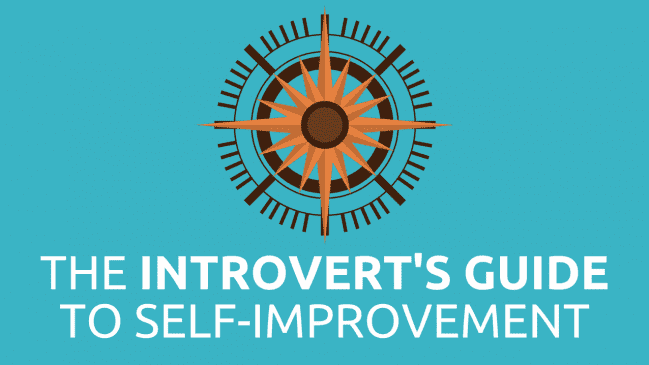As introverts, we have a tendency to be keenly aware of our shortcomings.
We are our own worst critics, and if we aren’t careful we can easily slip into periods of depression as a result of what we perceive to be a plethora of imperfections.
But we can avoid these negative side effects of our introspection by creating personal development plans that provide us with a structure for turning our weaknesses into strengths.
Personal development plans are short- or long-term goals combined with an action plan for accomplishing them. These plans also include a list of resources to be utilized throughout the process and other components that improve the likelihood for success such as mentorship, accountability, and self-reflection.
In this article we will outline the steps of creating and utilizing a personal development plan and provide you with a variety of resources–specifically catered to introverts— that will help you experience success.
Step 1: Personal Analysis
According to the Chartered Management Institute 1, the first step in forming a personal development plan is personal analysis.
The purpose of personal analysis is to determine the areas you would like to develop.
If you are planning a short-term development plan, it is best to choose one specific aspect to work on. If you are creating a long-term development plan, you can choose a broader goal and break it down into its individual components, each of which you will work towards developing.
Make sure to choose a reasonable objective so that you are not setting yourself up for failure.
Development plans are meant to help you hone in on areas you would like to improve so that you can create a series of steps for accomplishing them. If the objective of your development plan istoo vague, you will find that your plan will become extremely long and complex, and as a result you will be unable to accurately measure your progress towards your goals.
Step 2: Learning Resources
Now that you’ve chosen an outcome for your development plan, it is necessary to determine what resources are available to help you achieve it.
One of the best resources out there is the resource of other people.
Finding a mentor is one of the best ways to ensure you achieve your outcome. A mentor can be someone you know who you believe has already accomplished your desired outcome, or you can try to get in touch with someone who is an expert on the subject to ask if they’re willing to mentor you.
Your mentor can also serve as your accountability partner. In addition to sharing their wisdom and knowledge on the subject and guiding you in the right direction, a mentor can make sure you are working towards your goals and doing what you set out to do– even when the going gets tough.
However, your accountability partner doesn’t have to be a mentor. A close friend or family member whom you choose to confide in can hold you accountable as well.
As introverts, seeking out other people can be a difficult and unpleasant thing for us to do. But there are plenty of resources available to you that don’t require this type of one-on-one interaction.
Coursera.org is a website that offers free online courses created and taught by various colleges and universities around the world.
Coursera has an entire section of courses devoted to personal development, including topics such as mindfulness, leadership, communication, mental well-being, and more. Coursera also offers inexpensive specializations that provide you with a certificate upon completion, which can be useful if the outcome of your development plan could benefit you in your career.
Your local library is also a gold mine for personal development resources. If you prefer to read digitally, many libraries offer copies in ebook form. And if you’re not much of a reader at all, subscriptions to audiobook providers such as Audible are usually inexpensive as well.
Step 3: Goal-Setting
Once you have determined the desired outcome of your development plan and what resources are available to help you accomplish it, the next step is to set specific and measurable goals.
Measurable goals are those that require specific actions to be taken in order to be met.
When your goals are actionable, you can measure how successful you were based on whether you did or did not complete those actions with the desired result.
Say you have a short-term development plan with an ultimate outcome of a better becoming a better public speaker. Let’s look at some goals you might set to achieve this outcome and determine whether or not they are measurable.
Outcome: Become a Better Public Speaker
Time Allotted: One month
Goals:
1. Feel confident speaking in public.
NOT MEASURABLE. What specific actions will you take to become more confident speaking in public? This goal is not measurable because there are no concrete ways to determine the difference in your level of confidence.
2. Take a class on public speaking and pass.
MEASURABLE. This is a measurable goal because you can ask yourself: Did I or did I not take a class on public speaking? Did I or did I not pass the class? Did I or did I not learn practical tips on being a better public speaker?
3. Speak in public three different times without shaking.
MEASURABLE. This is a measurable goal because it is a specific action you can take. You can concretely determine your success by asking yourself: Did I or did I not speak in public three times without shaking?
4. Give a speech in public that people enjoy.
NOT MEASURABLE. This goal is not measurable because you cannot objectively determine whether or not your audience enjoyed the speech. Even asking several people from the crowd is not enough to determine whether or not you accomplished your goal.
5. Incorporate five strategies from “The Book of Giving Enjoyable Speeches” in my next speech.
MEASURABLE. This is a measurable goal because you can concretely determine whether or not you accomplished it.
Goals that put you closer to achieving your development outcome will consist of specific actions you can take. Effective goals must have a concrete way for you to determine whether or not you were successful.
Once you have made a list of the goals you need to meet in order to achieve your development outcome, you can determine how much time you think is appropriate for accomplishing them.
For a short-term development plan, you can give yourself several weeks to several months. It can also be helpful to give yourself time limits for each specific goal.
For example, if you have a short-term plan with five goals, you can give yourself one week to accomplish each goal. Your overall time limit will be five weeks.
If you have a long-term plan with 10 goals, you can give yourself six months per goal with an overall time limit of five years.
Step 4. Self-Reflection
The final component of your personal development plan is self-reflection.
It’s important to take some time each day or at the end of each week to reflect on your progress. Some self-reflection questions to ask yourself include:
- How are you feeling at this point in your development plan? Why?
- Have you found your goals easy or difficult to accomplish? Why do you think that is?
- What do you think is going really well in your development plan?
- What setbacks have you encountered?
- Are there any changes you can make to prevent those setbacks from occurring again?
- Are there any changes you can make to be more successful in accomplishing your goals?
- Overall, do you feel you have made progress towards your development outcome?
Keeping a journal to record your thoughts as you reflect is a good way to document your journey and take note of any patterns that may occur. Reflection helps ensure that you take note of your successes, but it also forces you to look more closely at your failures so you can work towards improvement.
Everyone has their strengths and weaknesses, but you don’t have to live with your weaknesses forever. Personal development plans force you to become intentional about improving yourself so that you can live more happily, confidently, and successfully.
Also, check out our guide on how introverts can make new friends.
Do you think a personal development plan could work for you? Tell us what outcomes you’d like to work towards in the comments!





